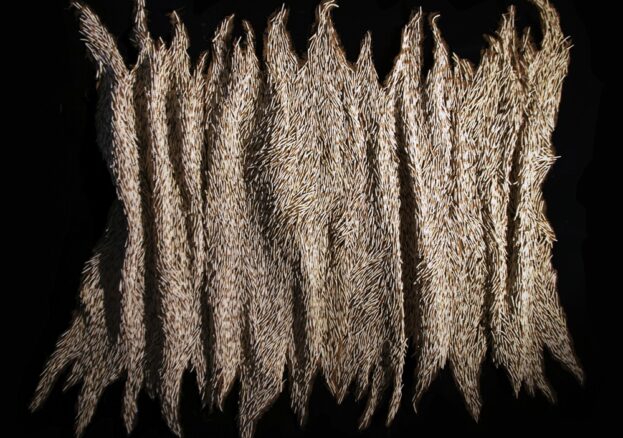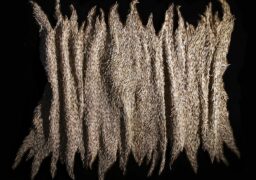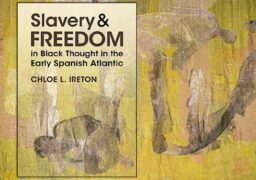
“It is easy to follow, but it is uninteresting to do easy things. We find out about ourselves only when we take risks, when we challenge and question.” – Magdalena Abakanowicz
October Gallery presents Material Sensibilities, an exhibition that brings together a dynamic group of artists exploring the liminal boundaries of creative materiality. Featuring works by Nnenna Okore, Naomi Wanjiku Gakunga, Susanne Kessler, LR Vandy, Jukhee Kwon, Sokari Douglas Camp, and Sylvie Franquet, the exhibition will also introduce new works by Xanthe Somers, Theresa Weber, Gaia Ozwyn, and Khadija Jayi. These works challenge traditional forms and engage with materials in unexpected and transformative ways.
Material Sensibilities focuses on sculptures, ceramics, and paintings, where the artists explore the complex relationship between their chosen materials and the interactive forms of expression that arise as they interrogate and respond to these materials. The exhibition features a variety of processes including cutting, weaving, burning, pasting, ripping, welding, and embedding, each piece offering an invitation to contemplate the dynamic interaction between the artist’s hand and the material world.
Featured Works and Artists
Nnenna Okore’s practice investigates themes of transformation and ephemerality. Using a labor-intensive process of disassembly and reconstruction, Okore creates sculptures from natural and found materials, often involving twisting, dyeing, and sewing. One such work, Hide, is a hanging wall sculpture made from hand-rolled clay elements sewn into burlap cloth, creating a textural experience that balances density and delicacy.
Naomi Wanjiku Gakunga is known for her imaginative wall-hanging sculptures crafted from oxidized sheet metal, steel wire, and various supplementary objects such as washers, fabric, beads, and seeds. Her piece Encino combines traditional weaving techniques with contemporary materials to explore the representation of natural objects in a sculptural form.
Susanne Kessler creates expansive installations that reflect on the cycles of growth and collapse in cities and civilizations. Her work Aggregations is inspired by the remnants of the One World Trade Center, symbolizing reconstruction after destruction. Kessler’s work explores the significance of the line in art, making it an essential element of both aesthetic and symbolic meaning.
LR Vandy transforms humble materials such as metal components and rope into vibrant sculptures that explore hidden histories of trade, power, and gender. Her large-scale works often reference the African diaspora and celebrate the abstract female form, with recent sculptures involving rope and other found objects like cogs, pipes, and washers.
Theresa Weber presents Archipelago Network, a tactile collage of materials like silicone, resin, beads, corals, and shells. Weber’s work responds to the ever-changing nature of identity, mapping the intersectional body from a de-colonial perspective that resists Western ideas of linear time and embraces organic forms.
Xanthe Somers, a Zimbabwean ceramicist, engages with post-colonial themes by combining traditional Zimbabwean material culture with political commentary. Her pieces evoke a sense of play and excess, addressing issues such as women’s work, cheap labor, overconsumption, and the impact of eco-racism in the Global South.
Gaia Ozwyn’s paintings merge sculptural elements with painterly gestures to explore the duality of nature and the complexities of belonging and separation. Raised between Afro-Caribbean and British cultural traditions, Ozwyn’s work reflects the harmonies and tensions of her multifaceted identity.
Khadija Jayi addresses gender inequality and identity through sculptures that explore tradition, power, and imagination. Her piece VOLCAN uses fire as a metaphorical tool to create permanent marks on paper, symbolizing the exclusion of the feminine from the public realm.
Jukhee Kwon from South Korea creates cascading sculptures by meticulously cutting and slicing through found or abandoned books, exploring themes of creation and destruction, absence and presence, and other natural cycles. The paper tendrils she weaves reflect delicate, organic forms.
Sokari Douglas Camp presents exuberant steel sculptures that celebrate the vibrant flora, fruits, and people of Suriname. Her works combine flamboyant playfulness with deeper explorations of cultural identity and contemporary issues.
Sylvie Franquet subverts traditional materials by reworking found tapestries, often drawing from canonical works of art. Her intricate needlepoint patterns often challenge the male-dominated art history, with a strong influence from her extensive travels in the Middle East and North Africa.
Gallery Talk: Artists in Conversation
On Saturday, 1st February 2025, from 3:00 – 4:30pm, Xanthe Somers and Gaia Ozwyn will join curator Eleri Fanshawe for a discussion about their work in the exhibition. The talk will delve into how the artists interact with their materials and how their practices inform the bold ceramics and textured paintings on display.
Admission is free, and the talk will take place on the gallery’s ground floor, which has disabled access.
Exhibition Details
- Exhibition Dates: 30th January – 1st March, 2025
- Private View: Wednesday, 29th January 2025, 6:00 – 8:30pm
- Venue: October Gallery, 24 Old Gloucester Street, London WC1N 3AL
- Opening Hours: Tuesday – Saturday, 12:30 – 5:30pm
- Admission: Free
- Website: www.octobergallery.co.uk



